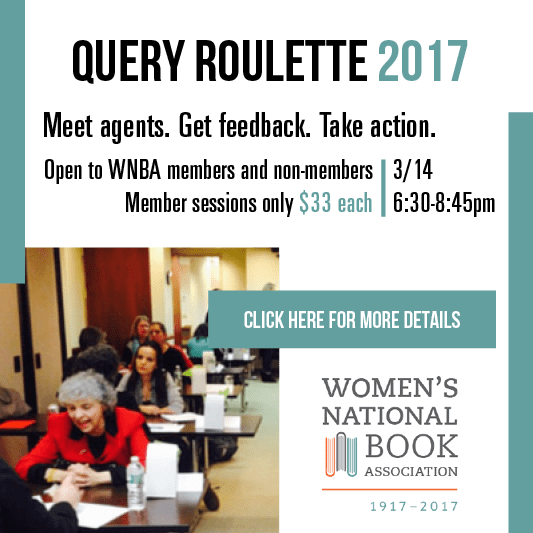At the WNBA/NYU panel Deconstructing Upmarket Fiction, four agents defined upmarket and gave advice to fiction writers. But before you read some of what they said, a reminder: the WNBA’s annual Open Mic Night is tomorrow, May 8! Whether you’re reading or listening, bring a guest—anyone can listen! Also, it’s time to send your member news, which will be shared nationally in The Bookwoman! Please email your news by June 28 to blog@wnba-nyc.org. News should be a maximum of 20 words and include your book art if applicable.
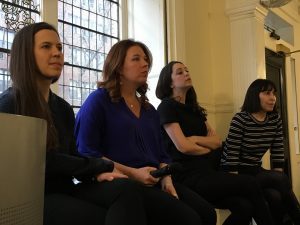
Caroline, Allison, Duvall, and Renee (L to R)
Photo credit Hannah Bennett
Deconstructing Upmarket Fiction featured four agents: Caroline Eisenmann, Allison Hunter, Duvall Osteen, and Renée Zuckerbrot. Moderator Harriet Shenkman started off the conversation with the basics: what, exactly, is upmarket fiction? What does the definition of it as having “literary appeal with commercial potential” mean? According to Duvall, “It’s probably the hardest genre to pin down…these are the books you see most often in bookstores. They have the pacing of the best kind of crime novel, but the plot isn’t gimmicky.”
Renée added, “One of the hallmarks of upmarket fiction is that anyone can pick it up and read it without feeling stupid.” Later, she said, “It’s sought after. It’s the sweet spot. The
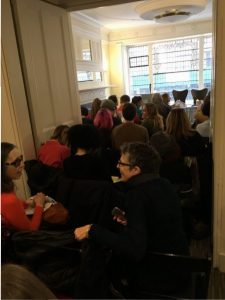
The event’s attendees
Photo credit Hannah Bennett
writing is really good, but it’s not navel-gazing. There’s something at stake and you’re emotionally invested.”
So, upmarket fiction: fast-paced, well-written, compelling. Like what? When Harriet named a few authors, Allison responded to Amy Tan with, “I think of a book like The Joy Luck Club as the ultimate upmarket.” Describing one of the authors she represents who falls under upmarket, she said Anna Pitoniak, whose first novel The Futures is a “coming of age from the female and male perspective about a young couple living in NewYork.”
Caroline, who described upmarket as “sweet spot fiction…[it] gives people a nutritious glow like literary fiction but is fun to read,” brought up gender distinctions. Responding to the question of whether John Irving is upmarket, she said “if men write domestic issues, they’re called literary. If women do, it’s called women’s fiction…I think ideas of readers being women and readers of domestic fiction being women is vestigial of publishing being male-dominated. And both are starting to change.”
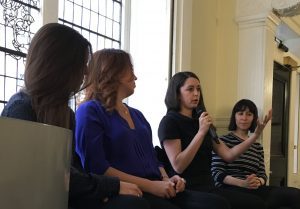
Duvall speaking
Photo credit Hannah Bennett
The lines between literary fiction, upmarket fiction, and women’s fiction became a key topic in the rest of the conversation. Renée called for an end to the term women’s fiction. While all the agents agreed that Philip Roth was literary, Allison and Caroline pointed out a problem in defining Meg Wolitzer. They argued that she’s literary, but, because she’s a woman, she’s often considered upmarket. “Positioning within the industry makes the difference,” Caroline stated.
Allison added, “It’s really exciting to see women beginning to break through. But it will always bother me that a Meg Wolitzer is being talked about differently than a Richard Russo. It bothers me because there’s a perception that literary is better quality…so that means we’re saying Meg Wolitzer is worse. If people say women aren’t literary and if they consider literary as better, that’s a problem.”
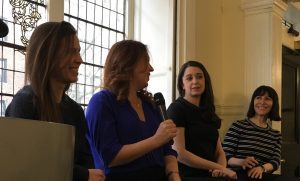
Allison speaking
Photo credit Hannah Bennett
So where does that leave writers? According to Duvall, upmarket fiction is “the hardest genre to write in because you really have to be superb at storytelling. The books that succeed in this area are deceptively simple.”
But there’s a way to get there: from Renée, “Read. Read across genres. Read everything. Literally read everything. And then think about it. Go back and see how it’s constructed.” (Duvall’s second: “That’s it. That’s the advice.”)
Once you’ve read literally everything, you can work on your own writing. Allison shared that she “tell[s] people to read their own work out loud. Especially dialogue. Does it sound like real dialogue?”

Caroline speaking
Photo credit Hannah Bennett
Meanwhile, Caroline suggested focusing on the core of the novel. “It’s really useful for an author to know what the hook of a novel is. In query letters, we can tell if you don’t know your hook. A hook is two to three sentences describing the book that will convince someone to read it. Describe it over and over to people who don’t know you to see whether they’re intrigued.”
Allison seconded that, particularly for use in query letters. “[The hook] is really important. If you can’t pitch your book, we can’t pitch it and editors can’t pitch it.”
But, according to Duvall, be careful not to over-pitch: “Your query letter should be short and sweet. Your hook should be three sentences or less and that’s it.”
It’s the perfect time to keep that advice in mind as you’re getting ready for Query Roulette in June!




